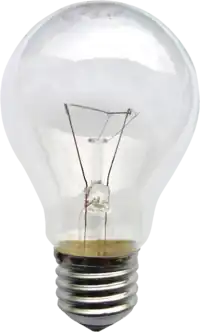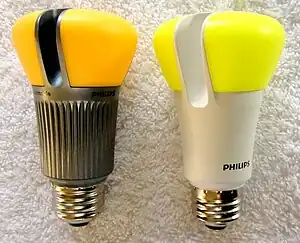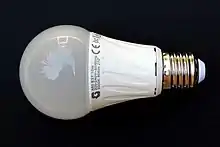A-series light bulb
The A-series light bulb is the "classic" glass light bulb shape that has been the most commonly used type for general lighting service (GLS) applications since the early 20th century. It has a pear-like shape and is typically fitted to either an Edison screw or a bayonet cap base. The number that follows the "A" designation indicates the nominal major diameter of the bulb, either in one-eighth inch units in North America[1][2][3] or in millimeters in the rest of the world.[4][5][6]

Physical outline
The most commonly used A-series light bulb type is an A60 bulb[7] (or its inch-based equivalent, the A19 bulb[2][4]), which is 60 mm (19⁄8 in or 2+3⁄8 in) wide at its widest point[3] and approximately 110 mm (4+3⁄8 in) in length.[8] Other sizes with a data sheet in IEC 60064 are A50, A55, A67, A68, A71, A75, and A80. Another common A-series light bulb type is the A15 bulb which is commonly used in the US for appliances and ceiling fans. The A15 bulb is 15⁄8 in (1+7⁄8 in; 48 mm) wide at its widest point and 3.39 inches tall.
Socket type
Most A19/A60 light bulbs come with an E26 type (i.e. 26 millimeters in diameter) in countries with a mains supply voltage of 100–120 volts, or an E27 type (i.e. 27 millimeters in diameter) in countries with 220–240 volts AC. A-series light bulbs using the older B22 bayonet twist type base are less common; they can be found in the UK and many British Commonwealth countries.
Specifications

IEC/TR 60887:2010[4] defines the A bulb shape as: "A bulb shape having a spherical end section that is joined to the neck by a radius that (a) has a centre outside the bulb, (b) has a magnitude greater than the radius of the spherical section, (c) and is tangent to both the neck and the curve of the spherical end section.". The same standard also defines in addition to the A shape also bulged (B), conical (C), elliptical (E), flame (F), Globular (G), (K), mushroom (M), (P), reflector (R), straight-sided (S) and tubular (T) bulb shapes, as well as several modifier letters and special shapes. Very similar to the A shape are the P shape ("A bulb having a spherical end section, and a conical mid section, the sides of which are tangent to the curve of the spherical section"), and its PS variant ("Tubular neck section below the bulb and above the approximate reference line").
ANSI C79.1-2002, IS 14897:2000,[5] and JIS C 7710:1988[9] define the "A shape" as "a bulb shape having a spherical end section that is joined to the neck by a radius", where the radius is greater than that of the sphere, corresponds to an osculating circle outside the light bulb, and is tangent to both the neck and the sphere. The Energy Star certification only requires omnidirectional light bulbs to fit the overall dimensions of the corresponding ANSI bulb type.[10]: 14.1
Lamp types

Although most A-shape bulbs have historically used incandescent lighting technology, some other technologies – such as compact fluorescent (CFL) or LED lamps – have been used in A-shape bulbs more recently.
References
- "Lamp Size and Comparison Features" (PDF). WW Grainger Inc.
Lamp size (maximum lamp diameter) is expressed by a number representing eighths of an inch.
- "LED University: Light Bulb Shapes and Sizes Explained". EagleLight.
'A' type bulb shapes are standard house hold light bulbs. The number after the bulb shape is the number of eighths of an inch in diameter. For non-imperial measured bulbs the number following the bulb shape is the number of centimeters [sic] at the widest point of the bulb. Standard bulb sizes include A19 in the United States and A60 for a slightly smaller metric measured bulb.
- "Light Bulb Reference Guide". Superior Lighting.
The letter indicates the shape of the bulb and the number relates to the diameter of the bulb in eighths of an inch. The most commonly used household bulb is the A-19.
- Glass bulb designation system for lamps. Technical report IEC/TR 60887:2010, Edition 3.0, International Electrotechnical Commission, 2010-06.
- "IS 14897 (2000): Glass Bulb Designation System for Lamps - Guide". Retrieved 21 March 2017.
A bulb shape having a spherical and [sic; end?] section that is joined to the neck by a radius [...] A60: An "A" shape bulb with a nominal major diameter of 60 mm.
- "LED Start GLS: 40, 60, 75 & 90w equivalents" (PDF). GE Lightling. Archived from the original (PDF) on 2017-03-21. Retrieved 2017-03-22.
- A19 Bulb Vs E26 Bulb: What’s the Difference? "A19 Bulb Vs E26", KRM Light+
- "Light fixtures and light bulb sizes". www.tuxgraphics.org. Retrieved 28 February 2017.
- "JIS C 7710:1988 電球類ガラス管球の形式の表し方" (in Japanese). Retrieved 2017-03-21.
- "ENERGY STAR Eligibility Criteria Version 2.0, Rev. Oct-2016" (PDF). Retrieved 2017-03-21.
Lamp shall comply with ANSI minimum overall length (min OAL), maximum overall length (MOL) and maximum lamp diameter values, where they exist